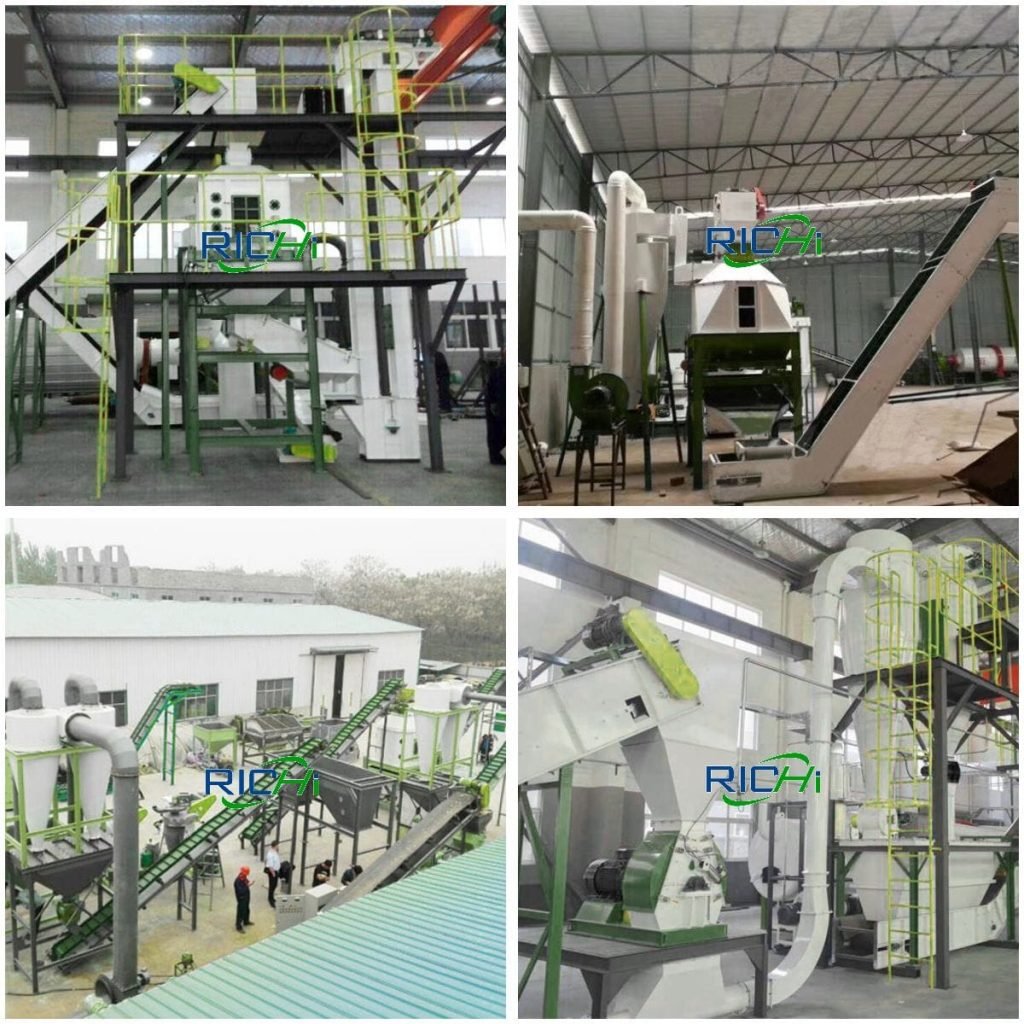Biomass pellet mills are machines used to convert biomass materials into pellets. The pellets produced by these machines are used as fuel in heating and energy generation applications. The size of the pellets produced by biomass pellet mills is an important factor to consider when choosing the appropriate pellet mill for your specific needs. In this article, we will discuss the different sizes of biomass pellets produced by pellet mills.

Biomass pellet mills produce pellets in a range of sizes. The most common sizes are 6mm, 8mm, and 10mm. The size of the pellets produced by a biomass pellet mill is determined by the diameter of the die used in the machine. The die is a metal component with small holes or orifices through which the biomass material is forced under high pressure to form the pellets. The size of the holes in the die determines the size of the pellets produced.
Related post: straw pellet production line
Pellets with a diameter of 6mm are the most commonly produced size by biomass pellet mills. These pellets are generally used for heating applications such as in wood stoves and pellet boilers. They are also commonly used in industrial applications such as power generation, where they are used in large-scale power plants. The 6mm size is popular because it burns efficiently and is small enough to be used in most pellet stoves and boilers.
Pellets with a diameter of 8mm are less common but still widely used in heating applications. These pellets are popular in countries where wood stoves and pellet boilers are common. The larger size of the pellets means that they burn longer and produce more heat, making them ideal for larger heating applications.

Pellets with a diameter of 10mm are the largest size produced by biomass pellet mills. These pellets are primarily used in industrial applications, such as large-scale power plants. The larger size of the pellets means that they burn longer and produce more heat, making them ideal for large-scale applications.
Related post: https://www.richipelletmachine.com/straw-pellet-production-line/
It is important to note that the size of the pellets produced by a biomass pellet mill can be adjusted by changing the size of the die. This means that if you require a specific pellet size for your application, you can choose a pellet mill with a die of the appropriate size. Some pellet mills also come with interchangeable dies, which means you can produce pellets in different sizes using the same machine.
The size of the pellets produced by a biomass pellet mill can also be influenced by the type of biomass material used. For example, hardwoods generally produce denser pellets than softwoods. This means that the pellets produced from hardwoods may be slightly larger in diameter than those produced from softwoods. Other factors that can influence pellet size include the moisture content of the biomass material and the pressure used to form the pellets.
In addition to the size of the pellets produced, it is also important to consider the quality of the pellets. Quality pellets are those that are uniform in size, shape, and density. They should also have a low moisture content and be free from contaminants such as dirt and rocks. High-quality pellets burn more efficiently and produce less ash than low-quality pellets.
To ensure that the pellets produced by your biomass pellet mill are of high quality, it is important to use high-quality biomass materials. The biomass materials should be dry and free from contaminants. It is also important to maintain the pellet mill properly by regularly cleaning and lubricating it. This will help to ensure that the machine operates efficiently and produces high-quality pellets.
In conclusion, biomass pellet mills produce pellets in a range of sizes, with the most common sizes being 6mm, 8mm, and 10mm. The size of the pellets produced is determined by the diameter of the die used in the machine. The size of the pellets can be adjusted by changing the size of the die, and the quality of the pellets is influenced by factors such as the type of biomass material used, moisture content, and pressure used to form the pellets. Quality pellets are uniform in size, shape, and density, with low moisture content and free from contaminants.
When choosing a biomass pellet mill, it is important to consider the size of pellets required for your specific application. If you are using the pellets for heating purposes, smaller sizes such as 6mm or 8mm may be suitable. On the other hand, if you are using the pellets for industrial applications such as power generation, larger sizes such as 10mm may be more appropriate. It is also important to consider the quality of the pellets produced and the biomass materials used.
In addition to the size and quality of pellets, it is also important to consider the production capacity of the pellet mill. This refers to the amount of pellets that can be produced in a given amount of time. Production capacity varies depending on the size and type of the pellet mill. Some pellet mills are designed for small-scale production, while others are capable of producing large quantities of pellets in a short amount of time.
The production capacity of the pellet mill is also influenced by the size of the pellets being produced. Generally, smaller pellets can be produced at a faster rate than larger pellets. This is because smaller pellets require less material and can be formed more quickly.
It is important to note that the cost of the pellet mill can also vary depending on the size, quality, and production capacity of the machine. Generally, larger pellet mills with higher production capacities are more expensive than smaller mills.
In summary, the size of the pellets produced by a biomass pellet mill is an important factor to consider when choosing the appropriate pellet mill for your specific needs. The most common sizes are 6mm, 8mm, and 10mm, with the size determined by the diameter of the die used in the machine. It is also important to consider the quality of the pellets produced, the biomass materials used, and the production capacity of the pellet mill. By considering all of these factors, you can choose the right biomass pellet mill for your specific application.
For details please contact: pellet mill
WhatsApp:86 138 3838 9622
Email:enquiry@richipelletmachine.com


